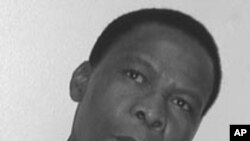Turn on any radio in the southern African country of Botswana these days, and, chances are, you’ll hear a song called Dog Eat Dog - the newest hit from Botswanan guitarist, singer and composer Banjo Mosele. It is topping the charts.
Banjo, born Timothy Mosele, has been a well known composer and singer in Botswana’s music scene for over two decades.
As a child in the 1960s, Mosele used to listen to mbaqanga music on South African radio stations. “Music that people like Hugh Masekela and Mahotella Queens were playing. You know, the old South African township music,” he says.
He also listened to rock and roll imported from the United Kingdom and the United States. “Just to hear the sound of an electric guitar those days …we used to put on the red ribbons and we all started playing this popular song by Jimi Hendrix called Hey, Joe. Every young guitarist then wanted to play that song, and I think they could,” he says.
After he graduated from secondary school, Mosele and a group of fellow students formed their own band, calling themselves, the In-Crowd. “In the late 1970s,” he says, “we were one of the most popular youth bands in the country.”
Meeting Masekela
Mosele was discovered in 1980 by South African music legend, Hugh Masekela, who had been living in the United Kingdom and the United States for years. Masekela had recently moved back to Africa, settling in Botswana. One evening, he went to see Mosele’s band play.
“We just jammed with him,” says Mosele. Masekela left Botswana, promising Mosele that when he returned, they would record together. “We didn’t believe him,” laughs Mosele, “but when he came back to Botswana, we recorded a record with him in 1983.”
That record was Techno Bush. The lead song, Don’t go Lose it, Baby, became a number one single in the United States. “That was a dream come true’ for me then,” Mosele says.
The In Crowd left Botswana and traveled to the U.S., where they remained for several years.
Looking back, Mosele knows how lucky he was. “It was a lot of experience,” he says, “Actually, I grew up around the best musicians from Southern Africa.”
On his own
In 1987, Masekela left Botswana to join Paul Simon’s Graceland tour, and Banjo began two years of music study at London University’s Goldsmiths College. There, he formed his own band, Bushmen Don’t Surf. He has been performing and recording independently ever since.
Mosele moved to Oslo, Norway in the 90's and performs frequently in Europe and the U.K. In 2003, he released his first solo album, Badisa; his second album, Movin' On, came out in 2005.
Mosele returns home to Botswana at least three or four times a year, and that’s where he recorded his most recent album Nowa Days collaborating entirely with local talent.
Lately, Mosele has been working with the Bostwana Musicians Union to better promote his country’s music. Botswana shares a border with South Africa, as well as common languages. Because of this, he says, there’s no reason why Botswanan music should not be able to break into the larger South African market and beyond.
See Banjo's latest hit video, Dawg eat Dawg
| Feedback |
| We'd like to hear what you have to say. Let us know what you think of this report and other news and features on our website. Email your views about what is happening in Africa to: africa@voanews.com. Please include your name and phone number if you would like us to include your comments on our programs. Or, telephone us and leave a message. In the US, call: (202) 205-9942. After you hear the VOA greeting, press the number "30" and leave your opinion. We may use it on our daily broadcasts. |




